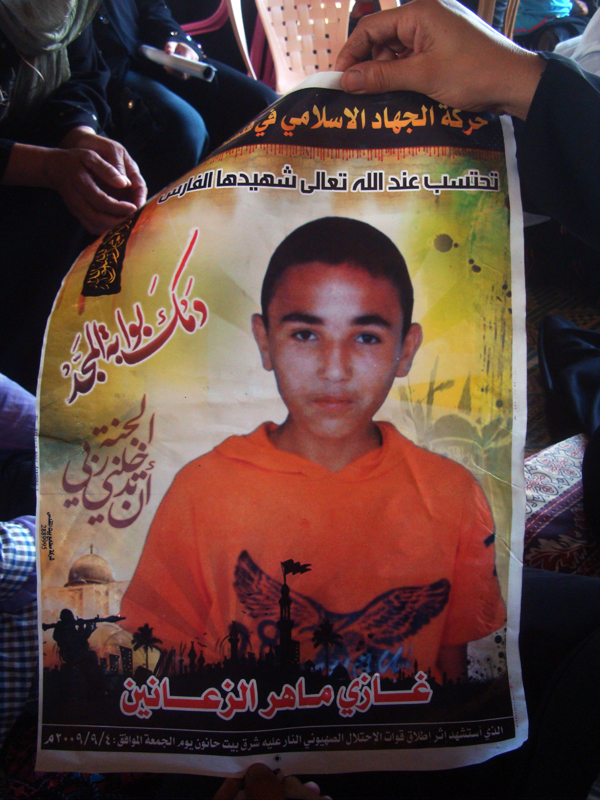5 October 2011 | International Solidarity Movement, Gaza
Around Gaza is a 300 meter “buffer zone,” a no go zone, a land of death. Gaza is not just a prison, it is a shrinking prison. Every time that Israel expands this zone, Gaza gets a little smaller. Every Tuesday, the Beit Hanoun Local Initiative and the International Solidarity Movement march into the buffer zone to challenge the occupation and the theft of Palestinian land. Today, we also marched in solidarity with the Palestinian prisoners who are on hunger strike in the jails of the occupation.
What could be more logical than one group of prisoners marching in support of another group of prisoners?
We gathered near the Agricultural College of Beit Hanoun at 11 a.m. We loaded olive trees, shovels, and big jugs of water onto the van. There was no space in the van, so all of the goods rode on top of the van. We set off down the road toward the buffer zone, slowly so that nothing would fall off the van as we drove down the rutted road. We reached the buffer zone, stopped the van, and began to unload the olive trees and everything necessary to plant them. These olive trees would join the others that we planted last week. We plan on slowly returning the lands of the buffer zone to what they were before the Israeli’s declared the area a zone of death, we plan on making olive groves flourish in the buffer zone. Our struggle is not just to return life to the buffer zone, but to make a regular life possible in the areas close to the buffer zone.
The buffer zone is now a little greener than yesterday after planting 20 trees in the buffer zone. The death that haunts this area is a result of the occupation and its relentless destroying bulldozers. The same bulldozers that crushed Rachel Corrie to death in Rafah in 2003.
Sabur Zaaneen from the Beit Hanoun Local Initiative spoke. He said that we must “affirm our right to land and cultivate and strengthen the resilience of farmers and their return to work the land despite all the terrorist practices of the Israeli occupation.”
“[We] need for a mass movement to support the Palestinian prisoners in Israeli jails.”
Around Gaza is a 300 meter “buffer zone,” a no go zone, a land of death. Gaza is not just a prison, it is a shrinking prison. Every time that Israel expands this zone, Gaza gets a little smaller. Every Tuesday, the Beit Hanoun Local Initiative and the International Solidarity Movement march into the buffer zone to challenge the occupation and the theft of Palestinian land. Today, we also marched in solidarity with the Palestinian prisoners who are on hunger strike in the jails of the occupation.
What could be more logical than one group of prisoners marching in support of another group of prisoners?
We gathered near the Agricultural College of Beit Hanoun at 11 a.m. We loaded olive trees, shovels, and big jugs of water onto the van. There was no space in the van, so all of the goods rode on top of the van. We set off down the road toward the buffer zone, slowly so that nothing would fall off the van as we drove down the rutted road. We reached the buffer zone, stopped the van, and began to unload the olive trees and everything necessary to plant them. These olive trees would join the others that we planted last week. We plan on slowly returning the lands of the buffer zone to what they were before the Israeli’s declared the area a zone of death, we plan on making olive groves flourish in the buffer zone. Our struggle is not just to return life to the buffer zone, but to make a regular life possible in the areas close to the buffer zone.
The buffer zone is now a little greener than yesterday after planting 20 trees in the buffer zone. The death that haunts this area is a result of the occupation and its relentless destroying bulldozers. The same bulldozers that crushed Rachel Corrie to death in Rafah in 2003.
Sabur Zaaneen from the Beit Hanoun Local Initiative spoke. He said that we must “affirm our right to land and cultivate and strengthen the resilience of farmers and their return to work the land despite all the terrorist practices of the Israeli occupation.”
“[We] need for a mass movement to support the Palestinian prisoners in Israeli jails.”



